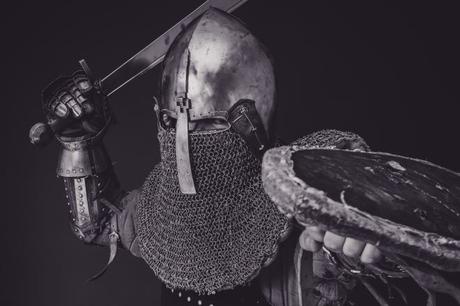
The Crusades are a time in medieval history that both fascinates and angers people.
In the History Channel show Knightfall, myth and storytelling combines with history to recount interesting tales about the Crusades and who was involved in them. Yet this period isn’t just about stories, it is also a time that many people regret. Two US Presidents in the last 20 years have publicly regretted the Crusades and what they stood for.
I first tasted the angry backlash when someone once barked at me, “How can you be a Christian, Stuart, following the Crusades? What the church did then was awful.”
This criticism has been stated and restated in many ways, and its often used by sceptics to point to the barbarism of Christians and to justify their unbelief. Loftus says of the medieval church –
“[they] sanction[ed] the slaughtering of various people … in the name of their God … the deeds done in the name of Jesus are atrocious.”[1]
So – what were the Crusades? In a short series of blog posts, I’m going to explain my understanding of what the Crusades were, and I’ll also respond to three common myths about them.
What Were the Crusades?
By the 11th century, two thirds of the lands previously under Roman Christian rule were conquered by Muslim invaders. The Christian inhabitants were treated brutally, as there were “gruesome tortures of Christian pilgrims to the Holy Land and vile desecrations of churches … should Constantinople fall … ‘the most holy relics of the Saviour,’ … would be lost.”[2]
In medieval times, Christian believers would very often make the trip to visit the Holy Land. At this time, travel was dangerous. But the Muslim authorities persecuted those pilgrims mercilessly, and worked to destroy the culture of the peaceful Christian inhabitants there.
So, the leader of the Eastern church, Pope Urban, called for the Western Pope to send help to fight off the invading Muslim armies. This wasn’t a message from secular government, rather it was a message from the church. Here’s how it was put to people in the West:
- this is a defensive war, to protect Christian brothers and sisters under siege, and to rescue religious relics in the Middle East.
- those who go will have all their sins forgiven for life. This was the ultimate Catholic indulgence that secured one’s eternal destiny.[3]
While many professional Knights embarked on the perilous journey across land, and later sea, to the Holy Land, many civilians went too. These people saw this task as a duty for pious Christians, and they wanted to help the people who were suffering in those lands. For around two hundred years, a cycle of these events occurred and multiple military campaigns – or Crusades – occurred.
Why Is This Important Today?
Because there is a myth that Western Crusader colonialism is to blame for the horrors of the crusades. US Presidents Clinton and Obama have fed this myth in recent years, and the myth has led to a confusion about the Crusades and what caused them. I think the myth is highly destructive to us in the West, and the Christian church.
First – the aim of the Crusades was the recovery of what had been Christian territory before it had been invaded by Muslim armies. It is destructive to the historical method to suggest that the crusaders were the aggressors.
Second – the Crusades have become a historical stick to beat the church with. Yet this caricatures what was going on back then, we can’t logically reject Christianity today for what Crusaders did then.
For example, while Medieval battles were fierce, it was how things were for all armies of the time. There was nothing singling out the crusader armies, except maybe the original motivation for engaging in the crusade.
Also – the battles were not inevitable. A surrendering Muslim army would have avoided the bloodshed that occurred on both sides.
Third – the crusading myths have been proposed by the West, not the Muslim nations, but certain Muslims have taken advantage of our myth and used it against the West. Before the 20th century, Muslim’s didn’t even have a word for the crusades! It wasn’t till 1899 that Islamic writers picked up the Western caricature. How interesting that Islamic terrorists have subsequently used our myth against us as part of the justification for their actions.[4]
[1] John Loftus, “Why I Am Not a Christian: A Summary of My Case Against Christianity (2008),” The Secular Web, accessed October 24th, 2018, https://infidels.org/library/modern/john_loftus/christianity.html.
[2] Rodney Stark, God’s Battalions The Case for the Crusades (New York: HarperCollins Publishers Inc, 2009), 2.
[3] Stark, 108.
[4] “Text: Osama bin Laden’s 1998 interview,” The Guardian, October 8th 2001, accessed October 25th 2018, https://www.theguardian.com/world/2001/oct/08/afghanistan.terrorism15, summarised.
Photo by Henry Hustava on Unsplash
